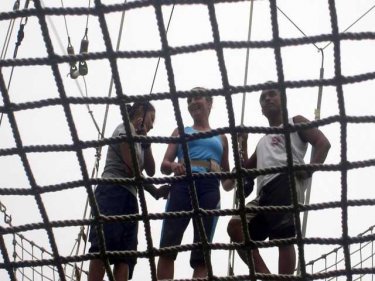WORKING in the US is the ultimate goal for many people in Thailand, and it may not be as hard to achieve as it seems for student resort workers.
Now comes a report that one US resort group alone has hired up to 250 foreign students to meet staffing requirements during the coming US summer.
''The students come to the US on J-1 visas through the Exchange Visitor Program, which Congress created in 1961 to enhance cultural understanding between nations,'' says the report in The Virginian-Pilot newspaper.
''In recent years, it has morphed into a major source of labor for many employers, particularly those in the hospitality industry.''
The numbers quoted show a large increase in summer workers in the US from overseas, from 22,635 in 1997 to 150,326 in 2007.
One employer brought in 96 students to work for an amusement park in 1998 and expects 663 this year.
Gold Key, which runs seven east coast beachfront hotels, sent human resources director David Finwall on his first recruiting trip overseas to Thailand last year, then to Eastern Europe in January.
''We don't have people to do these jobs,'' Finwall told the newspaper. ''US college students do not want to come and make beds and clean toilets for $7.75 an hour.''
The jobs are lowly-paid. As well as making beds and cleaning toilets, they also sometimes involve cooking and carrying luggage.
Visa are good for four months and workers can return.
Employers like the J-1 because it has fewer restrictions than other foreign labor programs, the newspaper says.
''There is no cap on the number of visas granted, and companies don't have to prove that they cannot find US employees to fill their jobs.''
Employers are full of praise for the overseas workers who come under the J-1. Each student needs a sponsor and the non-profit Council on International Educational Exchange is one of the largest, bringing in more than 30,000 students a year.
The publication of the article in The Virginian-Pilot brought a firestorm of responses, with some people deploring the use of non-American labor and others saying that America's youth were really not up to hard work.
William Bailey wrote: ''My experience comes from the military where I too thought the kids of today were not up to the standards of my generation.
''However that was proven wrong by the effort of the young military members once we started bombing in Iraq. They stepped up to the plate and put in many extra hours, nobody claimed to be sick or tried to get out of working long hot hours on the flight deck.
''I didn't think they had it in them. I was wrong. Today, I'm very impressed with the new generation.
''Maybe in the hospitality/retail industry you can't find an American kid willing to take the low pay, low skill positions. Frankly I wouldn't work in that industry either . . .
''It's not about entitlements; it's about growth, future potential and learning skills to be used in the next job for American kids.
''I wonder why anyone would clean a hotel room or mop up and make a hotel bed unless they had no future before them. I guess that is why you have to go overseas to hire.''
Thank you, Mr Bailey.
Anyone who still wants to see what the J-1 has to offer can start with the Council on International Educational Exchange site at http://www.ciee.org/
Now comes a report that one US resort group alone has hired up to 250 foreign students to meet staffing requirements during the coming US summer.
''The students come to the US on J-1 visas through the Exchange Visitor Program, which Congress created in 1961 to enhance cultural understanding between nations,'' says the report in The Virginian-Pilot newspaper.
''In recent years, it has morphed into a major source of labor for many employers, particularly those in the hospitality industry.''
The numbers quoted show a large increase in summer workers in the US from overseas, from 22,635 in 1997 to 150,326 in 2007.
One employer brought in 96 students to work for an amusement park in 1998 and expects 663 this year.
Gold Key, which runs seven east coast beachfront hotels, sent human resources director David Finwall on his first recruiting trip overseas to Thailand last year, then to Eastern Europe in January.
''We don't have people to do these jobs,'' Finwall told the newspaper. ''US college students do not want to come and make beds and clean toilets for $7.75 an hour.''
The jobs are lowly-paid. As well as making beds and cleaning toilets, they also sometimes involve cooking and carrying luggage.
Visa are good for four months and workers can return.
Employers like the J-1 because it has fewer restrictions than other foreign labor programs, the newspaper says.
''There is no cap on the number of visas granted, and companies don't have to prove that they cannot find US employees to fill their jobs.''
Employers are full of praise for the overseas workers who come under the J-1. Each student needs a sponsor and the non-profit Council on International Educational Exchange is one of the largest, bringing in more than 30,000 students a year.
The publication of the article in The Virginian-Pilot brought a firestorm of responses, with some people deploring the use of non-American labor and others saying that America's youth were really not up to hard work.
William Bailey wrote: ''My experience comes from the military where I too thought the kids of today were not up to the standards of my generation.
''However that was proven wrong by the effort of the young military members once we started bombing in Iraq. They stepped up to the plate and put in many extra hours, nobody claimed to be sick or tried to get out of working long hot hours on the flight deck.
''I didn't think they had it in them. I was wrong. Today, I'm very impressed with the new generation.
''Maybe in the hospitality/retail industry you can't find an American kid willing to take the low pay, low skill positions. Frankly I wouldn't work in that industry either . . .
''It's not about entitlements; it's about growth, future potential and learning skills to be used in the next job for American kids.
''I wonder why anyone would clean a hotel room or mop up and make a hotel bed unless they had no future before them. I guess that is why you have to go overseas to hire.''
Thank you, Mr Bailey.
Anyone who still wants to see what the J-1 has to offer can start with the Council on International Educational Exchange site at http://www.ciee.org/





Yeah. so much nice juicy and attractive talk here. After all the sweet talk here sounds good to the International student, this makes him imterested and he invests so much in participating, then the proud and aggressive US Embassy f***s up the students dream. thinking that everyone wont return back to where they came from because they think that everyone is a fan of the American way of life.
Hisses.
Posted by Ndu 1 on June 20, 2008 16:26